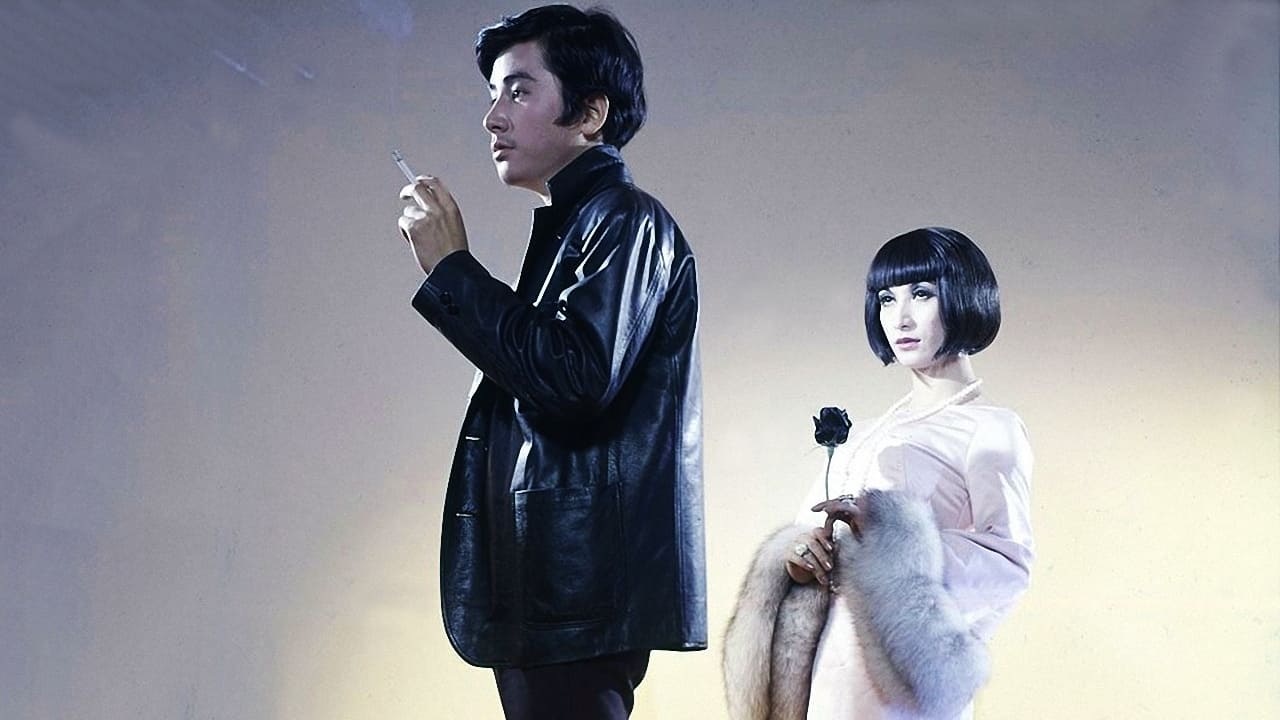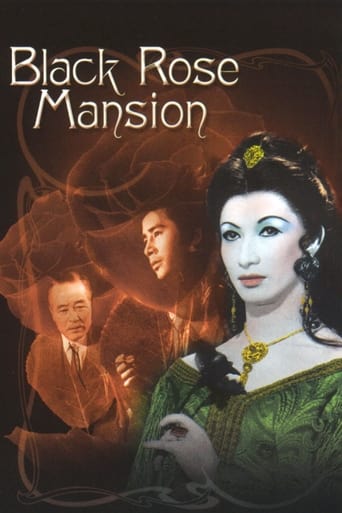FilmFlaneur
Director Kenji Fukasaku - the dedicatee of Kill Bill - is still best known to western audiences for his final completed feature, the nihilistic and striking Battle Royale. But back home the director had a reputation over his career for a fine run of yakuza movies. Before he made the bulk of these successful films however, during 1968-9, the director stepped away from his usual studio Tohei to work on some different projects in quick succession. From this time dates the independent crime drama Blackmail Is My Business, an oddball space piece The Green Slime, as well as Black Lizard and then finally Black Rose Mansion.The last two formed a deliberate pairing, Fukasaku's style creating in both an atmospheric blend of art house and exploitation. Black Rose Mansion, in particular, has a claustrophobic and melancholic air of its own, which relates it to cinema maudit. And while Black Lizard was a film version of a Yukio Mishima stage adaptation of Edogawa Rampo's flamboyant piece, pitting a master detective against a cross dressing jewel thief, Black Rose Mansion is also about a thief - but one who steals the love and self respect of those men who encounter her. Both films also feature the vaguely camp and sexually ambivalent figure of Akihiro Maruyama, better known by the stage name of her alter ego Akihiro Miwa. These two films represent his only two starring roles, although in recent years he has provided part of the voice talent for Princess Mononoke (1997). As a female he makes for a striking figure, tall and graceful, even if not (although this could be an occidental thing) conventionally beautiful as a woman.Part vamp, part siren, part cross-dressing seductress, Miwa plays his part straight in Black Rose Mansion, leading to the question of whether the audience is supposed to 'know' his real sex and, if so, what dimension this brings to the erotic side of the film. One assumes that the original audiences did know, which adds to the peculiarity of it all. In the hothouse of the eponymous club, where there is little or no other competition for male admiration, the effect engendered is rather as if straight-faced Danny La Rue had been cast to appear in Gilda. (Allegedly the director had some problems in motivating some male co stars to act as required with the male star.) Besides the club in which Ryuko finds herself so besieged by suitors, the singer also carries a black rose of her own. A symbol for her heart, she alleges it will change to red, but only when she finds 'real love'. It's also an apt symbol for the confusions of the central role as a perfect black rose we're told does not exist. Like the impossible flower she holds, the character of Ryuko asks the audience to see one thing and believe in another. A second, less natural black rose is given by Warataru to help patch things up with his mother, although at the end kept out of the world in its glass case and this remains on object of curiosity than inviting a romantic blooming.Although naturally absent from the black blooms themselves, red is a colour which plays an important part elsewhere in the visual scheme of the film: whether in the blood spilt by Ryuko's doomed lovers, or the foreboding and passion it brings when the screen is tinted so strikingly at appropriate moments. Black Rose Mansion may owe something to the psychedelia of the 1960s, especially in the rock 'n' roll night club in which the brooding Waraturu often finds himself, but the use of colour is more suffocating than in Black Lizard. In the striking opening, for instance, as the singer arrives, the "calm sunset before the storm to come" at least as noted by Kyohei, who has stopped off by the quay on the way home from work. Here the whole long scene is drenched in a warm red, as if the whole world had turned to passion - or blood.Critics have compared the "Mabuse-esque thrills" of Black Lizard to the "dreary Gothic melodrama" of its successor, and certainly the earlier title is more dramatic, having stronger material to work from. Black Rose Mansion also suffers from a degree of cheapness - notably in some of the action sequences, even if such moments - usually rashness on the part of the singer's lovers - do not lay at the heart of a film more about the hypnotic call of Ryoku's alluring 'madness'. But the Fukasaku was good enough an artist to raise most material above the ordinary and the director with his co writer Hiru Matsuda (responsible too for the cult Female Prisoner 701: Scorpion, 1971) between them make an interesting job of it, creating an original script rich in atmosphere, a portrait of men dazzled by an unfathomable creature with odd fascination and presence for audiences 40 years on.That's not to say Black Rose Mansion is not without its longueurs; the static nature of some of its scenes, whilst suggesting just how much Ryoku's admirers are immobilised by the new arrival (with some irony Kyohei tells Ryoko that, without her, the mansion is "like a museum of mummies") do at times drag. The narrator seems too acquiescent to events, hardly to be expected from a rich and powerful man so quickly fallen into infatuation. For a film made so quickly to capitalise on a previous success, the acting is acceptable while the director helps things along as much as he can with some imaginative editing techniques like freeze frame, rapid cutting as well as the aforementioned filter work. Although the later title, at least, is not essential Fukasaku the novelties of both Black Lizard and Black Rose Mansion make them worth seeking out.
sebbyangel
This movie is basically a gorgeous showpiece for Akihiro Miwa, a famous female impersonator in Japan. Akihiro is actually a very interesting person who has written several mind-opening books about his own life and philosophies. He definitely has a stage presence and even if he doesn't fully pass as a woman physically, he has the mannerism down to a believability and he wears gorgeous clothes.The plot is negligible and the whole movie really was thrown together to showcase Akihiro and that really is it. The cinematography is good and the colors are beautiful along with the set pieces. I would lump this movie in with other 60's/early 70's foreign movies that mixed Poe with erotica and camp, like Vampiros Lesbos, Daughters of Darkness, and Beyond the Valley of the Dolls. Its less a movie and more a well-choreographed documentation of a unique performer and a wild time-period.
bbbandbbb2003
Shochiku stylized melodrama, with Kabuki influence in that the female lead is played by a female impersonator. The unspoken irony is that this object of male desire and obsession is played by a man with a very male face, height, hands. His studied precision at mimicking traditional Japanese female characteristics makes the response of the male characters seem appropriately pathetic. Fukasaku's studied use of visual metaphor has a distancing effect. An odd, but fascinating film. Don't watch it for the plot. Watch it for the complex point of view and the lead's tour de force performance. It doesn't belong to the same category as the John Waters' films. There's no mockery here, self or other.
skullgame
I hate to disagree with the first review, but I think this is a pretty good film. While it doesn't hold up to the first film in the series (Black Lizard), this is an impressive sequel. If only Black Lizard were available on DVD, the 2 films would make great bookends to the story. Kinji Fukasaku (of Battle Royale fame) has a writing style that many can't follow easily & has a tendency to be abrasive to some, but this film stands high in my book in the psychedelic 60's film genre. Also, not much is made of the fact that the leading lady is actually a leading man, which disturbs some, but in my opinion only enhances the camp factor. A Fun, weird caper from a time & place that no longer exists.

